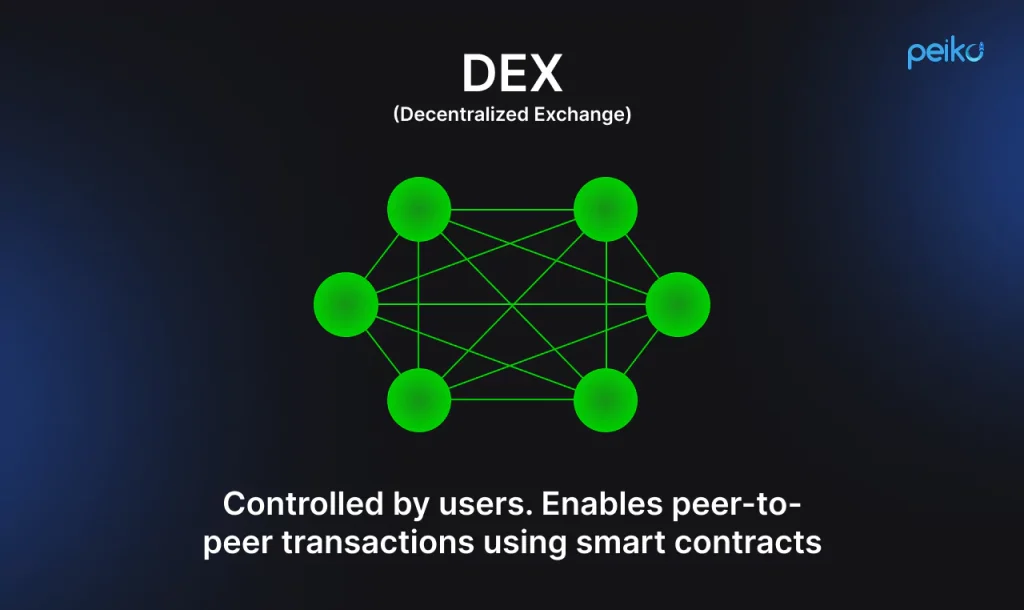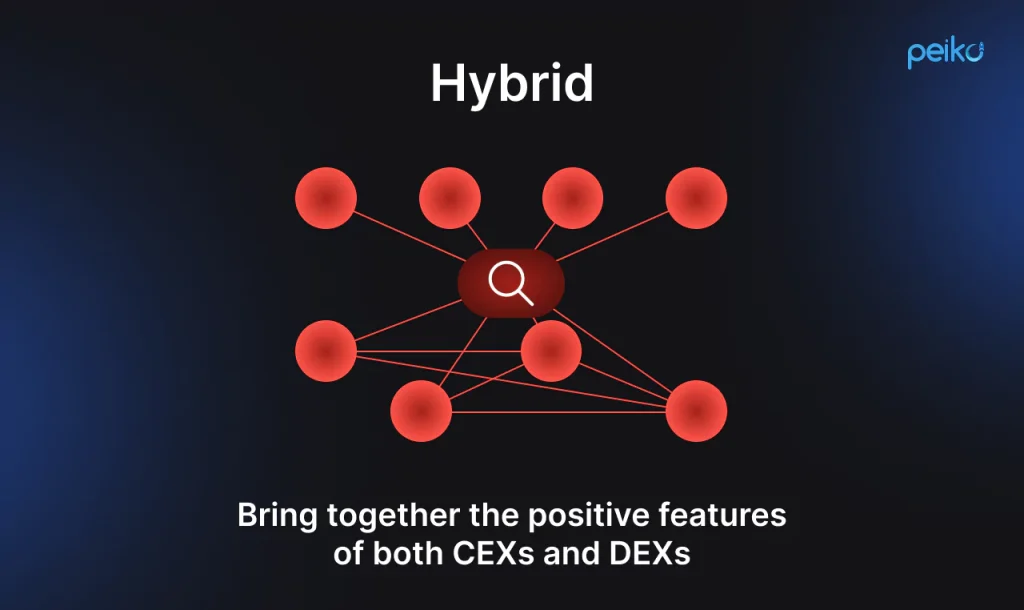Cryptocurrency exchanges are online sites where digital currencies are exchanged. These platforms come in three types: centralized exchanges (CEXs), decentralized exchanges (DEXs), and, also, hybrid crypto exchanges (HEXs). How do they differ?
CEXs are controlled by a central entity. Typically, these platforms offer a simple interface. DEXs, however, are done without a central agency. They provide more freedom for individuals with their ownership and greater anonymity but have greater navigational complexity.
HEXs combine both DEX advantages and CEX key benefits. These exchanges offer decentralization benefits with some aspects of centralization, like a more simple user interface.
Want to learn more about the differences between these types of exchanges? This article is for you.
Centralized exchanges
Let’s talk about CEX advantages and drawbacks. These are platforms on which users are able to buy, sell, and trade cryptocurrencies, with the intermediary being the exchange. Centralized exchanges manage the entire process of the transaction, ranging from matching buying and selling orders to keeping users’ funds.
Some of the well-known centralized exchanges include Binance, Coinbase, and Kraken.
The interesting thing about CEXs is that they rely on a central authority to regulate their operations. It is such an arrangement that the users must trust the platform in order to safely handle their funds as well as personal information. In return, centralized exchanges offer the user such advantages as plenty of liquidity, easy-to-use interfaces, as well as a variety of cryptocurrencies. They also offer customer support, which can be extremely helpful.
However, despite CEX advantages, there are risks with centralized exchanges as well. Since they keep their users’ funds with them, they are exposed to hacker attacks, regulatory issues, or technical failures. Under such circumstances, the users stand to lose their money. Furthermore, since CEXs provide control over the assets of their users, they differ from decentralized exchanges, where the users are in complete control of their money.
CEXs are popular because they are easy to use and convenient. They are regarded as being a secure method of trading, especially for new cryptocurrency traders. A key advantage of CEX is that clients within CEXs do not pay gas fees for transactions and only pay when depositing or withdrawing funds.

Decentralized exchanges
Such platforms enable direct exchange between users of cryptocurrencies without the use of an intermediary. Founded on blockchain technology, DEXs execute trades through smart contracts rather than a central authority.
Examples of such DEXs are Uniswap, SushiSwap, and PancakeSwap.
DEXs tend to have more anonymity, as they do not involve comprehensive identity verification processes (KYC/AML) like in most centralized platforms.
But DEXs present their own issues. Without the central organization, they are often more complicated to use, perhaps making them less attractive to new entrants. They are also less liquid than centralized exchanges, which could result in worse trading conditions for larger trades and more slippage.
Despite these limitations, decentralized exchanges are increasingly becoming a popular option for those who need secrecy and asset control.

Hybrid exchanges
This third type of exchange merges the strengths of centralized and decentralized exchanges. They offer users a composite trading experience that brings together convenience, security, and control. Having the best of both worlds, hybrid crypto exchanges fuse centralized order matching and settlement with decentralized aspects like self-custody and peer-to-peer transactions.
Some examples of such platforms are DeversiFi and Nash.
One of the biggest HEX advantages is that it provides the user-friendly functionality of centralized exchanges, such as fast trade execution and high liquidity. At the same time, they allow users to retain control of their assets, such as decentralized exchanges.
The model reduces the risk of having funds under the control of a centralized platform. Hybrid crypto exchanges also typically offer advanced trading options, such as spot and derivatives trading, for more skilled traders.
Hybrid cryptocurrency exchanges are still in their early days, and the technology that supports them is continuously developing. While they attempt to balance the experience, they may not yet equal the liquidity or security that is offered by purely centralized exchanges. Also, the user experience can be inconsistent since some hybrid platforms are still fine-tuning their features and user interfaces.
Despite these challenges, hybrid crypto exchanges are an attractive middle ground for traders who desire both security and speed, along with greater control of their assets.

Comparing CEXs, DEXs, and HEXs
When selecting a cryptocurrency exchange, it’s important to understand the distinctions between centralized exchanges, decentralized exchanges, and hybrid platforms. These different crypto exchanges offer unique benefits and drawbacks, making them suitable for diverse types of users.
Below you can see a comparison table with the key features of each platform.
| Feature | Centralized exchanges | Decentralized exchanges | Hybrid crypto exchanges |
| Control of funds | The platform holds the funds | Users maintain full control of their assets | Users retain control over their assets |
| User experience | Beginner-friendly, easy-to-use | Can be challenging for newcomers | Offers a blend of ease of use with self-custody |
| Liquidity | High liquidity and fast transactions | Generally lower liquidity | Liquidity is improving, but still moderate |
| Security | Susceptible to hacks and platform failures | High security, as users control private keys. However, vulnerabilities may exist in smart contracts | Balances convenience with security |
| Privacy | Requires identity verification (KYC) | Typically no KYC required | KYC-free, with better security than CEXs |
| Fees | Usually lower trading fees | Higher due to network transaction costs | Lower fees than CEXs and DEXs |
| Order matching | Centralized order matching | Peer-to-peer order matching | Centralized matching with decentralized features |
| Regulation | Subject to governmental regulation | Less regulated | May be regulated, depending on the platform |
| Support for advanced features | Full range of trading options (spot, margin, etc.) | Fewer advanced trading features | Offers a range of advanced features, combining CEX and DEX benefits |
What to consider when choosing between different crypto exchanges
When designing to build your own cryptocurrency exchange, choosing the appropriate type—centralized, decentralized, or hybrid—is important to achieving your objectives. The model of exchange you use will determine everything from the user interface to regulatory approval.
So, what should you consider when deciding between different types of cryptocurrency exchanges?
Target group and user experience
If your aim is to serve beginners or retail traders, then a CEX may be the optimal choice for you. It will generally be simpler to operate than a DEX, with easy interfaces and support from customers, which tends to appeal to newcomers.
If you wish to serve more professional traders or those who like to be in charge of their investments, then a DEX or a hybrid exchange crypto may be more appropriate to such a strategy. These ones give more freedom but at an increased learning expense for both developers and users.
Security and control
One of the most important considerations in building an exchange is how you are going to manage user money and security.
CEXs keep users’ money and, therefore, become primary targets for hacks, so excellent security is a necessity. If control of user funds is paramount, you can use the benefits HEX or DEX, which both enable users to keep their private keys in control.
Liquidity considerations
For an exchange to be successful, it has to be extremely liquid. CEXs tend to fare well here since they have centralized order books and increased market depth. This makes them attractive to traders who are interested in fast execution and high volumes of trades.
Liquidity problems may arise with DEXs, especially for smaller-hyped tokens or periods of low volatility. HEXs are more liquid than DEXs but less than a fully centralized exchange. If liquidity is essential to your business model, a CEX may be the best choice.
Regulatory compliance and privacy
If you’re designing an exchange that will be serving international markets or international markets with strong regulatory compliance, CEXs will be more likely to fall under regulatory supervision. This will necessitate them to have KYC and AML procedures.
On the other hand, DEXs do not usually work under KYC limitations, offering greater anonymity to users. They will, however, need to deal with regulatory challenges, depending on the state or country. HEXs provide a middle ground, with some anonymity benefits and more formality than DEXs, which will appeal to some users and markets.
Fee structure
CEXs normally have more favorable fees on trades, possibly attracting high-frequency traders. However, they may also charge some other withdrawal or deposit fees. DEXs will often have higher transaction fees because of the expense of the blockchain network.
HEXs, while typically having a fee structure between DEXs and CEXs, may still need to factor in network congestion and blockchain transaction fees, especially if they are combining on-chain and off-chain features.
Development sophistication and maintenance
CEXs are generally more complex to implement and maintain due to the demands for secure, centralized infrastructure, sophisticated trading engines, and regulatory acceptability.
On the other hand, the construction of DEX would typically be simpler in infrastructural aspects because the exchange is not centrally controlled. Despite the DEX advantages, they are need maybe more attention to building smart contracts and user interfaces would be required.
HEXs combine system complexities and would potentially require an advanced technical stack to balance decentralized liquidity with centralized order matching.
Launch your own crypto exchange fast with Peiko
Skip the lengthy development cycle and have a fully branded, white-label exchange launched in just three weeks (!). Our solution offers a professionally designed platform that is launch-ready quickly and efficiently.
Peiko’s exchange provides seamless TradingView integration, real-time market data, and analysis tools for professionals. It is built on a scalable microservices architecture for high liquidity and commission-free automated trading. Security is prioritized with Fireblocks for custody, 2FA, and data encryption for safeguarding. You are in full control with a customizable admin panel for managing users and orders in real time.

Our solution offers a rapid start, scalability, and peak performance, with 24/7 support and regular updates. And you can choose your hosting platform from top providers like Azure, AWS, and Google Cloud.
Conclusion
If you are at a crossroads of what types of crypto exchanges to create, you must weigh factors such as control, liquidity, security, and regulatory requirements. If ease of use and liquidity are your priority, then CEX is the direction to go. If privacy and decentralization are your concern, then DEX or HEX platform is probably what you need.
The Peiko team offers you a unique solution on how to create a reliable cryptocurrency exchange in just 3 weeks. If you are interested in how our team can help, contact us today.
FAQ
We believe that a centralized exchange is ideal for beginners. If this is your target audience, then choose CEX. Such exchanges offer a simple interface and customer support.
Skilled traders often prefer decentralized or hybrid types of crypto exchanges. On these exchanges, users get more control over their assets and obtain access to advanced trading features.
CEX is centralized with high liquidity but requires trust in the platform. DEX is decentralized, giving users full control but lower liquidity. HEX combines the features of both types of cryptocurrency exchanges. It offers centralized matching with decentralized control.









